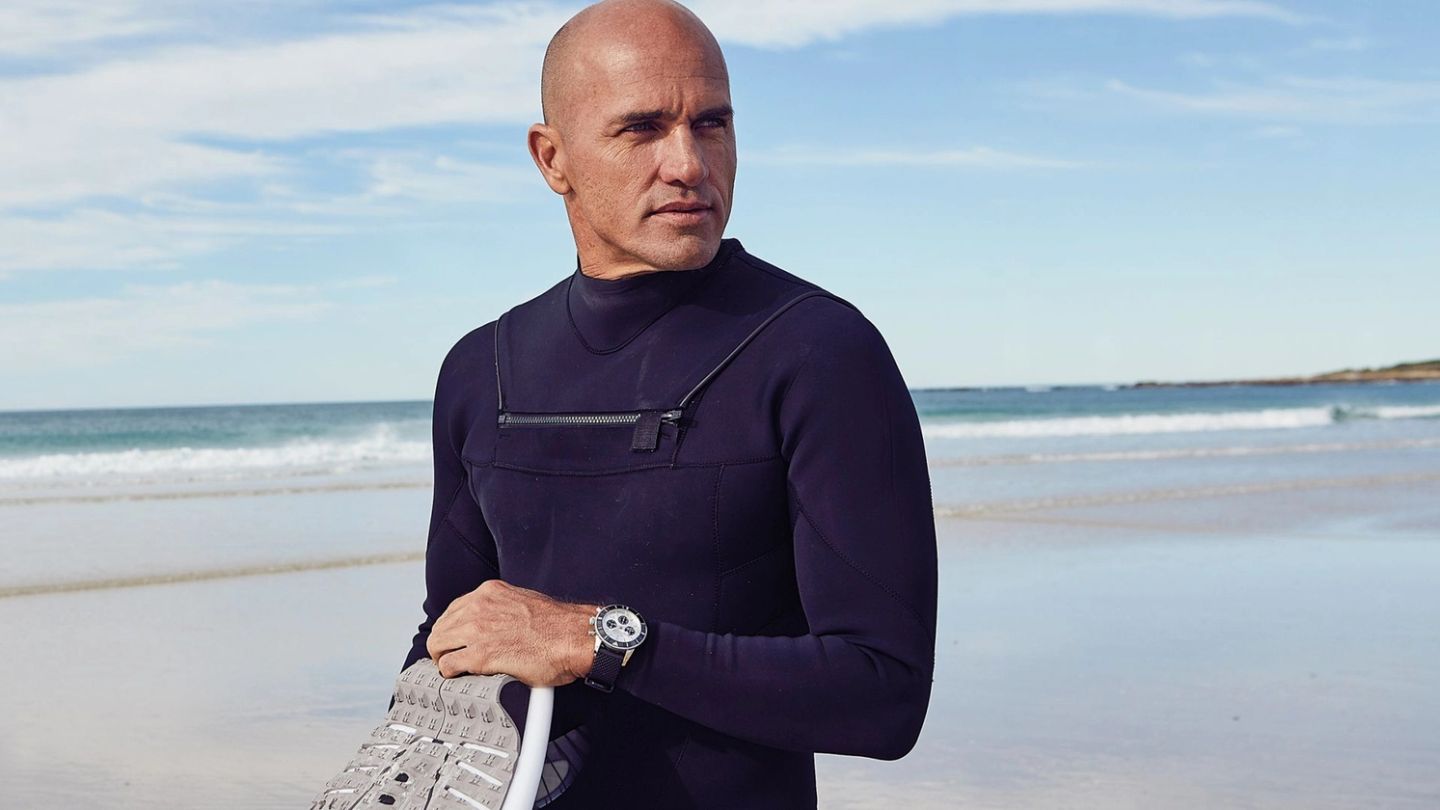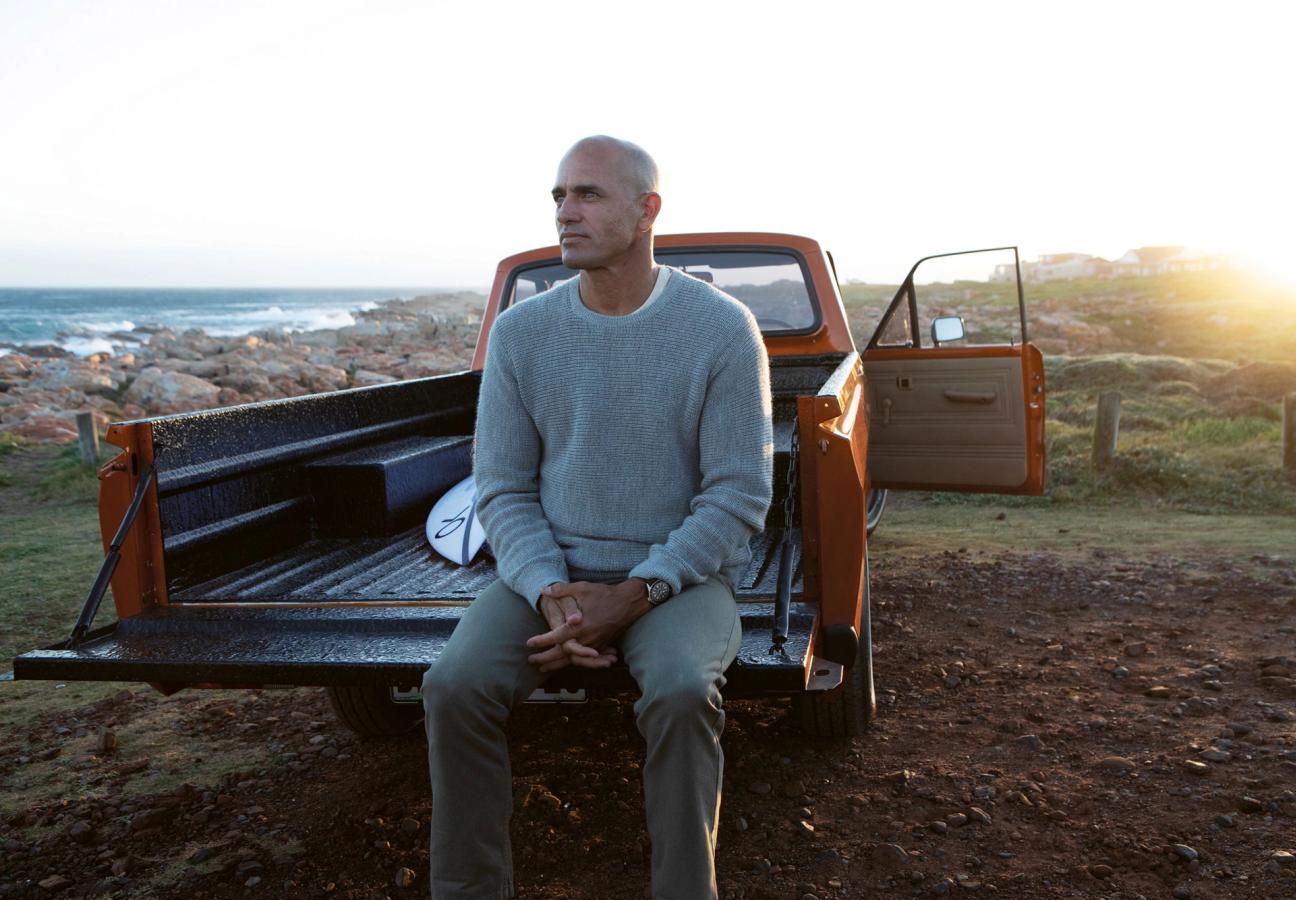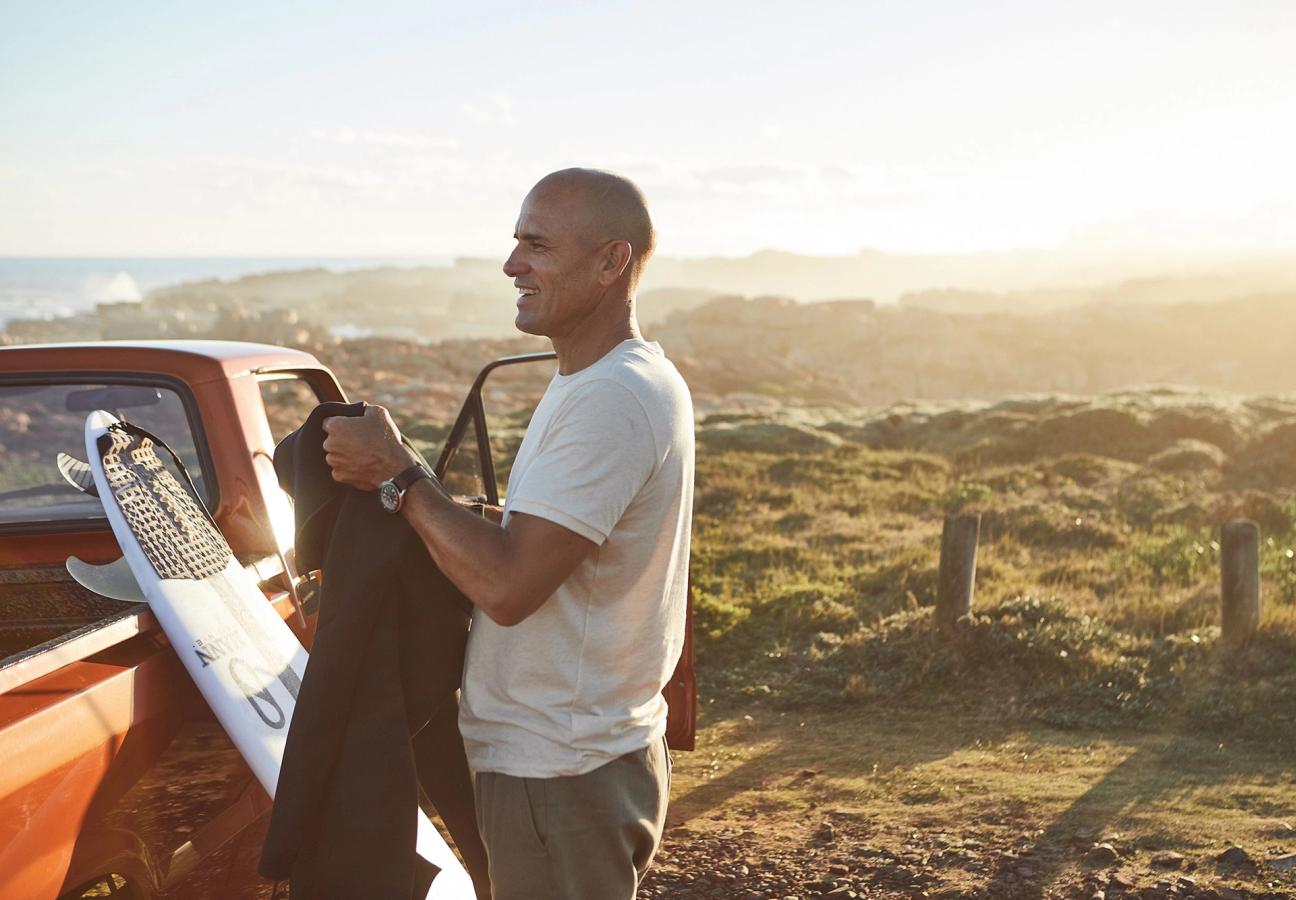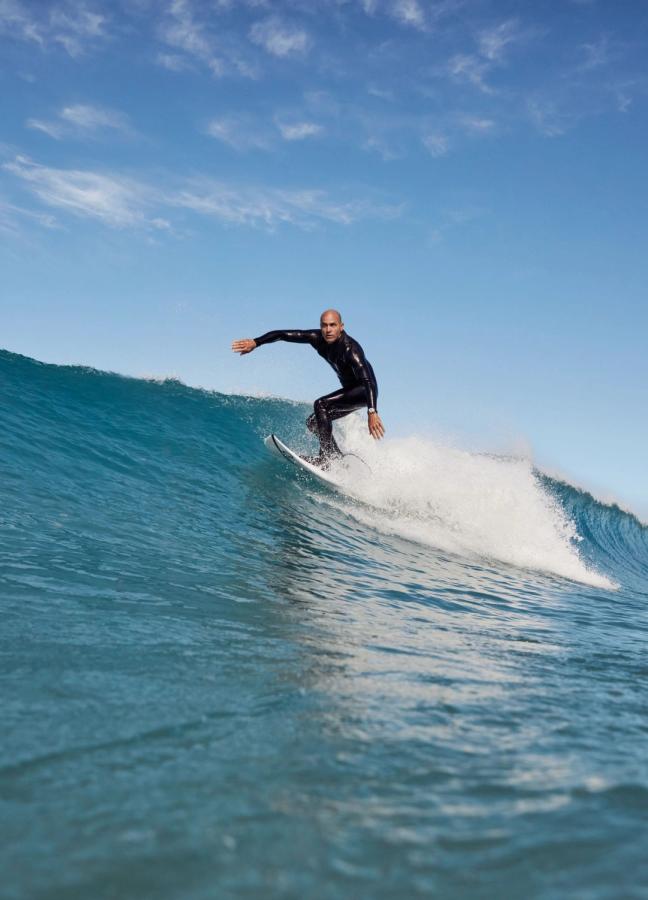

Kelly Slater on surfing, sea pollution and starting a cryptocurrency
The world surfing champion and Breitling ambassador reveals his plans to change — and save — the world…
- Words: Harry Shukman
Cryptocurrency might not seem like an obvious new venture for Kelly Slater. But once you’ve won eleven world championships and surfed waves as big as houses, most things must seem possible. And now the ‘Goat’, as his fellow surfers call him — meaning the ‘Greatest Of All Time’ — says he’s mulling over whether to create a cryptocurrency of his very own, having observed the rise of Bitcoin and Ethereum with increasing curiosity.
But for now that can wait. First — the planet. Climate change and the environment are issues very close to Slater’s heart, and they run through every new venture he takes on. The surfer is on the phone, in fact, to discuss a watch he’s made with Breitling, which boasts a recycled ECONYL nylon strap co-designed with Outerknown, his clothing company.
“It’s important, now more than ever, that companies bring in the environmental aspect to their brands,” he begins. “Whether it’s sourcing material behind the scenes, or telling that story in the products they build or the textiles they use or the supply chain that’s being created for them.”
The Breitling and Outerknown collaboration can help to lead this conversation, he says — a reminder, every time we check our wrist, of the constant battle against plastic in our oceans. “There’s been so many places I’ve been in the world that are so disgustingly polluted, it’s astounding. If people don’t see it and aren’t actively being affected by it in the moment, it’s like it doesn’t exist. So you have to bring this up and talk about it.”

Kelly is one third of Breitling’s ‘Surfers Squad’, alongside Stephanie Gilmore and Sally Fitzgibbons — a team that hopes to bring the watchmaker’s long involvement with the ocean into a new, modern chapter. Breitling’s groundbreaking divers watches have been staples of the sea-going community since their invention in 1957.
But in the decades since, the make-up of those oceans has changed dramatically, and only for the worse — hence the watchmaker’s ongoing, grass-roots commitment to the cause, in a luxury world that all too often resorts to buzzwords. For them, it’s personal.
Elsewhere, another Slater venture repurposes wood otherwise destined for the scrapheap — hence a possible name for Slater’s coin, which he throws out as a gag on our call: Woodcoin. “We’ve got to work on something a lil’ better than that,” he jokes.
"There’s been so many places I’ve been in the world that are so disgustingly polluted..."
Although it is just an idea at this stage, Slater says he’d like for his putative cryptocurrency to be linked to his new wood recycling company. Carbon credits come to mind as a comparison.
“Because I’m so interested in crypto, and my partners are too, we’re brainstorming,” he says. “But we’re talking out our ass right now, because we don’t really know what we’re doing, but I know people who do know what they’re doing, so I’ve started reaching out to people in the crypto world who make these things. We’ll see if there’s something we can do that’s a positive one, and not a fly-by-night coin where people are just trying to make a quick buck overnight.”
Slater, 49, says he’s “a hack at best” when it comes to cryptocurrency, but he fluently discusses blockchain, inflation, the federal reserve, and trillion-dollar assets. “I think it’s interesting to have a currency – a storage of value – that isn’t controlled by a CEO or a government,” he says. “It’s an exciting, rare time for people to do their investing themselves.”
To me, this sounds a lot like the conversations you read on Wall Street Bets, the outrageous Reddit forum whose amateur day traders upended the financial establishment with the GameStop fiasco. Slater says he’s a fan of WSB, and compares them to David and Goliath, although he is not a Reddit user. “I think it’s cool that people can take back the power if they want to,” he adds. “Sometimes a shake-up is good.”
If WSB has Slater’s admiration, Elon Musk has drawn his ire. Last month, he trashed the billionaire entrepreneur, saying he was “bad for crypto”. Tesla, Musk’s electric car manufacturer, revealed that it purchased $1.5bn worth of Bitcoin and announced that it would accept purchases in the cryptocurrency. But suddenly Musk u-turned, citing the environmental cost of Bitcoin mining and transactions.
Slater’s response came on Instagram, hinting to his 2.7 million followers that he smelled a rat: “So a guy who owns an energy company doesn’t understand this stuff before he buys it? Has no problem taking the profits. Does he have an issue with kids mining cobalt in the Democratic Republic of Congo to build batteries?”
He went on: “[Musk] could probably address and potentially help solve the real energy issues (68 per cent of the energy produced in the US, for instance, is wasted… seems like a bigger issue to me which would solve any BTC problem.”
On our phone call, Slater picks his words carefully when discussing his Musk post. “I do hope that Bitcoin is more widely accepted by different industries and people and money managers, and it seems like it’s going in that direction,” he says. “At the same time, it seems like there’s people coming in who aren’t in it for its purpose… it seems to me there’s some manipulation going on with it and I’m afraid that’s what happens with stocks and companies in that way.”

Speaking to Slater about cryptocurrency for so long might seem like avoiding the elephant in the room. If you had arranged a phone call with, say, Michael Jordan, would you ask him for his views on big tech regulation, or quiz Roger Federer about the oppression of the Uighurs in Xinjiang?
But it was on reading Slater’s autobiography, Pipe Dreams, and seeing the excellent and moving documentary, Momentum Generation, which charts the arrival of American surfers in the early 1990s, that I realised there was nothing I could ask him about surfing that he hadn’t answered already over the course of his lengthy career.
He first won the world championship in 1992, aged 20, and had been winning competitions as a teenager long before that (he has won the world title on another ten occasions, by the way — by this metric he is the greatest male athlete of all time). So there will have been countless press junkets in which he will have been asked about his wins, his losses, his board, his friends, his foes, his hair, the waves, the crowd, the fans and the weather.
It’s also well known that he’s got a clothing line and that partnership with Breitling mentioned above, as well as a wave machine company, a video game, and that he did a stint on the campy coastguard show, Baywatch (his friends teased him about it for years), and is a dab hand at the ukulele, golf, and jiu-jitsu. Cryptocurrency might be the final frontier.
“Sometimes a shake-up is good...”
In his autobiography, Slater describes his competitiveness, which he remembers from way back, when he was growing up in Cocoa Beach, Florida, and took on his big brother Sean at everything. An interesting aside from this era: he used to go by his first name – Robert – because kids at school called him Smelly Slater. And when he was a kid, a local newspaper wrote about him and misattributed the interview to “Kevin Salter”.
Anonymity did not last long, however, and by his own description, Slater’s legendary competitive drive started to show when he entered surf competitions and felt what he writes was “a strong desire to outdo my teammates”. Part of the reason, he describes, was that he came from an “imperfect family” — his dad struggled with alcoholism — and that spurred Slater to find refuge in the sea. “Surfing was the one thing that was always there for me; it made me smile,” he writes. “Rather than confront the issues at home, I closed up in my little shell and shut everyone out of my life.”
Ross Williams, one of Slater’s mates from the Momentum Generation – a raucous, fearless group of young surfers who came up together – says in the documentary of the same name that his pal had “raw motivation, almost like demons”.
That driving force led to some dark, cut-throat years when Slater’s need to win edged out his friends and family. Reconnections and reconciliations have since followed, and today, he appears a changed man. His reputation as a legendary sportsman is stronger than ever – fans of his have designed shirts with his face on them – but he says he tries not to get “comfortable” with fame.

When we speak, he describes visiting his daughter’s school and being asked for autographs and pictures, and his daughter telling him: “It’s not good that people know you.” He also remembers a trip to Rio de Janeiro as a 20-year-old rising star, and flying out of Florida, where he was Everyday Kelly, before landing in Brazil, where he was a celebrity sensation, and needed eight bodyguards to keep him safe.
“I get there and there’s throngs of people screaming my name at the bottom of the hotel, under my apartment – they know which apartment’s mine, so now I can’t even look over the balcony because as soon as I do there’s all these screams,” he remembers. “It was really wild, man. Such a culture shock for me to have that come into my life.”
Touchingly, he speaks of this period of rocketing into the celebrity stratosphere as a “strange and daunting time”. “Part of your innocence leaves when you become known by a lot of people,” he says. The lesson is not to be “too connected to that person people think you are”.
His focus now, however, remains on raising awareness about plastic pollution – he had to cut short a recent surf session in Bali because there was too much rubbish in the sea, and is familiar with getting sick from surfing in dirty water. His work with Breitling is an important part of this battle — a way of making a meaningful nod to sustainability in the sometimes behind-the-times world of luxury.
And then, of course, there’s the cryptocurrency. Slater doesn’t want Woodcoin – or whatever it’ll be called – to be a meme currency like Dogecoin, which “literally has zero purpose for anyone”. In fact, he says: “Those all need to disappear.” A new technology, he says enthusiastically, “should have some kind of utility or protocol that makes a company or people’s lives better”. He just needs to come up with a name.
This article was taken from the Summer 2021 issue of Gentleman’s Journal. To learn more, and subscribe today, click here…
Further reading


The most luxurious gym clubs in London in 2026

